
How To Make a Will in South Australia (2025 Guide)
A Step-By-Step Guide to Creating a Last Will and Testament In South Australia
Create a legal Will in South Australia to protect your assets and loved ones. Under the Wills Act 1936 (SA), anyone over 18 with testamentary capacity can draft a Will. If you’re ready to Make a Will South Australia, this guide walks you through each step—from writing your Will to signing it with valid witnesses—so you can feel confident about your final wishes.
Why make a Will in South Australia?
A Will is a crucial legal document that sets out how you want your assets—such as property, finances, and personal belongings—to be managed and distributed when you pass away. It also allows you to make important decisions about your family’s future, including naming guardians for minor children. By creating a Will in SA, you help ensure that your loved ones are cared for according to your wishes rather than the strict intestacy rules set by the state. If you don’t have a Will, South Australian law decides how your estate will be divided, which may not match the arrangements you would have chosen.

Legal Requirements to make a Valid Will in South Australia
If you plan to make a Will in SA, you must follow the guidelines set out in the Wills Act 1936 (SA). Failing to do so could result in your Will being considered invalid, which may complicate probate. Below are the key requirements:

You must be at least 18 years old. Exceptions apply if you’re married or obtain permission from the court.

Have testamentary capacity. You need to fully understand what a Will is, the nature and value of your assets, and who might be entitled to make a claim on your estate.

Put it in writing. In South Australia, oral Wills are not legally recognised. Your Will must be a physical document—either typed or handwritten—and signed according to the rules below.

Sign with Two Witnesses. The person making the Will (the testator) must sign, while two competent witnesses watch in real time. Although it’s permitted for a beneficiary to serve as a witness, doing so can lead to additional legal hurdles.
By meeting these basic legal requirements for Wills in South Australia, you help safeguard your estate plan. Otherwise, your Will could be contested or invalidated, and a court may end up deciding how your assets are distributed.
Step-by-Step: How to Make a Will in South Australia
1. Choose an Executor
An executor is the person who carries out the instructions in your Will, ensuring your assets are distributed according to your wishes and any outstanding debts are paid. They also handle legal processes—such as applying for a Grant of Probate through the Supreme Court of South Australia.
When you make a Will in SA, select an adult who is organized, reliable, and comfortable managing financial and legal tasks. Common choices include trusted family members, close friends, or a professional advisor.
To avoid complications, it’s wise to name a backup executor who can step in if your primary choice becomes unavailable or unwilling to serve.
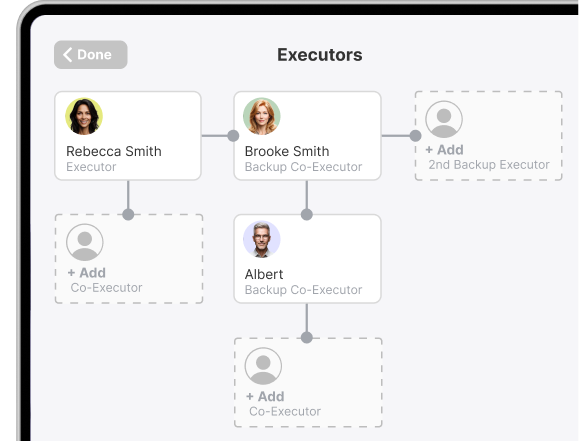
2. Name a Guardian for Minor Children
A crucial part of making a Will in SA is deciding who will care for your children under 18. By naming a guardian, you ensure that someone you trust makes day-to-day decisions about their education, healthcare, and general well-being if you are no longer around.
Although it’s not strictly required by law, most parents consider it essential. If you fail to appoint a guardian, the Supreme Court of South Australia could step in and assign someone, which may not align with your personal preferences.
It’s also a good idea to name a backup guardian in case your primary choice is unable or unwilling to serve.
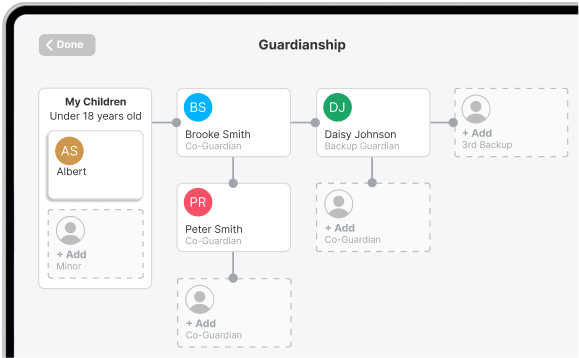
3. Name a Pet Carer
If you want to make a Will in SA that covers every aspect of your estate, don’t overlook your pets. By naming a dedicated pet carer in your Will, you can specify who will look after them and even set aside funds for food, vet bills, and other essentials. This way, your furry companions stay safe and well-cared-for according to your wishes.
While not legally mandatory, choosing a pet carer is an important step if you want more control over your pet’s future. If you don’t designate one, your executor or the courts might step in to decide who assumes responsibility—which may not align with what you had in mind. For extra peace of mind, consider naming a backup carer in case your first choice is unable or unwilling to serve.
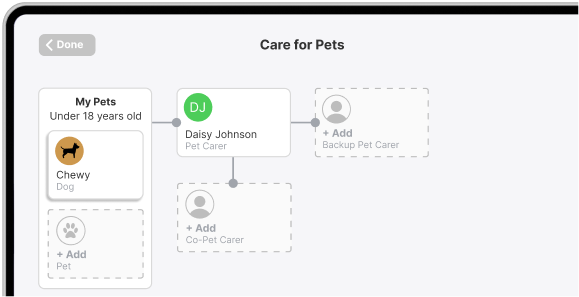
4. Decide who inherits your Residual Estate
When you make a Will in SA, your residual estate is what remains after you’ve settled any debts, taxes, and specific gifts. This could include real estate, bank accounts, or personal valuables. You’ll need to choose one or more beneficiaries—family, friends, or charities—and specify exactly what share or percentage each should receive.
Listing beneficiaries by their full names helps avoid any confusion down the line. It’s also smart to name alternative (backup) beneficiaries if your first choices are unable or unwilling to inherit. By clarifying these details now, you reduce future disputes and ensure your final wishes are carried out in line with South Australian law.

5. Gifting Specific Items
When you make a Will in SA, consider which special belongings—such as family heirlooms, jewelry, or real estate—you’d like to leave to specific people. Clearly describe each item, and include details like serial numbers or photos to avoid future disputes.
It’s best practice to prepare an inventory of all your assets before finalizing your Will. That way, you’ll know exactly what you’re gifting and ensure none of your treasured possessions are overlooked.

6. Any Additional Instructions or Provisions?
You can add optional clauses, like funeral preferences or instructions to sell certain assets. You might make a gift conditional or set up a trust until beneficiaries reach a specific age (e.g. 25 years old). Including these details helps ensure your wishes are followed without ambiguity.

Review Your Will
Confirming Roles in Your Will
Before you officially make a Will in SA, confirm that your selected Executors, Guardians, and Pet Carers understand and accept their responsibilities. This step can help prevent future disputes and ensure each individual is prepared for their role.
It’s good practice to discuss these duties with everyone you nominate (and their backups) to ensure they’re comfortable fulfilling them. By clarifying roles when you make a Will in South Australia, you minimise surprises later on.

Executors
Guardians
Pet Carers
Test Your Will
Before finalising your Will, consider potential scenarios—like a beneficiary passing away first or specific conditions going unmet. Visualise how your wishes would unfold under different circumstances, and adjust your Will as needed. This extra step ensures your Will covers every possibility.
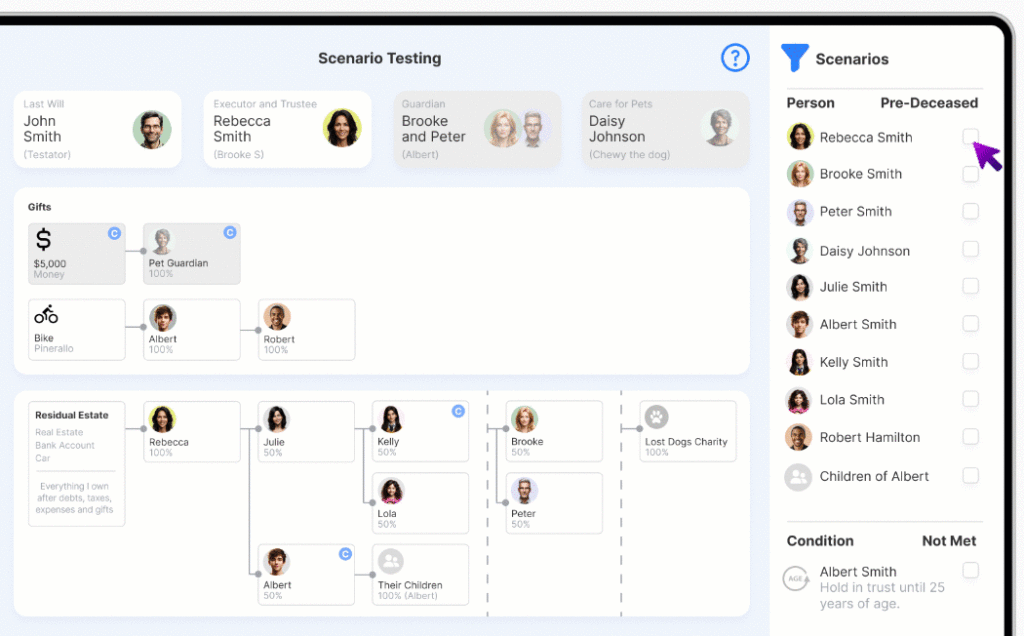
Signing Your Will
Signing Your Will In Front of Witnesses
Once you’ve drafted your Will, the next essential step is signing it correctly so it meets all legal requirements under the Wills Act 1936 (SA). Here’s what you need to know when you make a Will in SA:
Witness Requirements
- Two Witnesses: You must sign your Will in the presence of at least two witnesses at the same time.
- Age & Awareness: Witnesses should be 18 or older and understand that they’re witnessing your signature.
- Beneficiaries as Witnesses: While a beneficiary can serve as a witness under South Australian law, doing so could lead to additional legal scrutiny. Whenever possible, choose disinterested parties to avoid potential challenges.
After you sign, both witnesses must also sign the document, confirming that they watched you sign and that you appeared to have testamentary capacity (sound mind) at the time.
Is Notarisation Required?
You don’t need a notary for Wills in Australia (including South Australia). If your Will meets the witness requirements, the Court generally accepts it as valid without a notarial seal or stamp.
What about Online Wills in SA?
If you use any Online Will platform in South Australia to make your Will, it is essential that your Will is printed and signed according to these instructions. Having a Will online in South Australia that has NOT been printed and signed will not be considered valid.
Storing Your Will
Keep Your Will Safe
After you’ve completed and signed your Will, the final step is to keep the original document safe and accessible. In South Australia, only the physically signed copy holds legal weight—digital or scanned versions do not. Losing or damaging this crucial document could create extra challenges for your Executor and beneficiaries later on.
No Official Registry for Living Wills: South Australia does not provide a government-run registry for living people’s Wills. That means you need to choose a secure storage option so your Will can be easily located when it’s needed. Here are three common choices:
Store at Home
Keep your Will in a locked filing cabinet, safe, or fireproof box. If you entrust it to a friend or family member, make sure they understand the importance of protecting the original.
With an Attorney
If you used a lawyer’s services to make a Will in SA, they might offer to store the original document for you in a secure facility. This option can add peace of mind, knowing your Will is protected by professionals who understand local legal requirements.
Trusted Person
If you have a close friend or family member outside your household, you can leave the Will with them. Ensure they know how critical it is to keep the document safe from loss or damage and can produce it when needed.
Let your chosen Executor (and any backups) know the exact location of your Will. That way, they can access it quickly and avoid unnecessary legal complications should something happen to you.
FAQs: Making a Will in South Australia
1. What Are My Options for Creating a Will in South Australia?
When you make a Will in SA, you have several methods to consider:
- Online Platform: For straightforward estates, an online service (such as Will Hero) provides an easy, cost-effective way to draft a valid Will online in South Australia. Step-by-step guidance ensures you include key details.
- Hire a Lawyer: Ideal for larger or more complex estates, or if you need professional advice on trusts, tax planning, or other specialised issues.
- Handwrite Your Will: As long as you follow SA’s witnessing rules (see FAQ #3), a handwritten Will can still be legally valid in South Australia.
2. Do I Need a Lawyer to Make a Will in South Australia?
In most cases, you do not need a lawyer to write a valid Will in SA. If your estate is fairly simple and your wishes are straightforward, you can draft a Will online or even create a handwritten one. However, if your estate includes complex assets—like trusts, multiple properties, or tax-related concerns—seeking legal advice offers added reassurance and can help you avoid costly mistakes later on.
3. Are Handwritten Wills Valid in South Australia?
Yes. Under the Wills Act 1936 (SA), handwritten Wills are legally acceptable if they meet the standard witnessing requirements:
- The testator signs in front of two witnesses who watch at the same time.
- Each witness must also sign, confirming they were present and you had the capacity to make a Will.
If these conditions aren’t met, the Supreme Court of South Australia could use its “dispensing power” to validate the Will, but that process can be unpredictable and expensive. To avoid complications, always ensure two independent witnesses are present from the outset—regardless of whether your Will is typed or handwritten.
4. Is there Any Inheritance Tax in South Australia?
Australia (including South Australia) does not levy an inheritance or estate tax—sometimes called “death duties.” However, you could face capital gains tax (CGT) if you later sell inherited property, shares, or other investments at a profit.
While inheriting assets in itself isn’t a taxable event, having complex assets (like multiple properties or sizable investments) may still involve tax considerations. It’s wise to consult a tax professional when you make a Will in SA, so you fully understand any potential CGT or other obligations.
5. Do I Need to Notarise My Will in South Australia?
Generally, no. Under South Australian law, a Will is valid as long as it meets witnessing requirements—two witnesses present at the time of signing—without the need for a notary. As long as you follow the rules outlined in the Wills Act 1936 (SA), your Will should be legally recognised.
6. Can I Change My Will After It’s Signed?
Absolutely. If you have testamentary capacity (sound mind), you can modify your Will at any point. Common ways to do this include:
- Add a Codicil: A formal amendment that updates or clarifies specific parts of your existing Will. It requires the same witnessing process as your original Will.
- Write a New Will: A fresh document that explicitly revokes all previous Wills and codicils. Once the new Will is signed, it’s best practice to destroy old versions to avoid future confusion.
If you have complex changes—like adding a trust or altering major bequests—consult a legal professional in South Australia to ensure your revisions are valid and enforceable.
7. What Happens if I die without a Will in South Australia?
If you die intestate (without a Will), South Australian intestacy laws dictate how your estate is divided. Usually, this means your closest relatives inherit according to a legal formula. If you have no immediate family, the state may claim your property.
Additionally, a court may have to appoint a guardian for any minor children, which could conflict with your personal preferences. By taking the time to make a Will in SA, you ensure that you—not the courts—decide who manages your estate and cares for your loved ones.
8. What is Probate?
Probate is the legal procedure that confirms a Will’s validity and oversees the distribution of the deceased’s assets. In South Australia, the Supreme Court (via its Probate Office) grants what’s known as a Grant of Probate. If there is no valid Will, the court follows SA’s intestacy laws, determining how assets are allocated.
When you make a Will in SA, you typically appoint an executor who applies for probate and carries out each of the following steps:
- Filing the Will
The executor submits the original Will and a petition to the Supreme Court of South Australia. If no Will exists, they file for intestate succession. - Appointing an Executor
If a valid Will names an executor, that person manages the estate. Otherwise, the court appoints an administrator to fulfill the same responsibilities. - Inventory of Assets
The executor identifies and values assets (e.g., real estate, bank accounts, investments) as well as any outstanding debts or liabilities. - Paying Debts and Taxes
The executor settles all debts, taxes, and final expenses before any distributions are made to beneficiaries. - Distributing the Estate
Once debts are cleared, the executor allocates the remaining assets according to the Will. If there is no Will, assets pass to heirs under South Australia’s intestacy rules. - Closing the Estate
After all obligations are fulfilled, the executor files a final petition to officially close probate.
Understanding probate in South Australia helps ensure you draft a Will that can be smoothly executed. By choosing a reliable executor and following local requirements, you make the process as straightforward as possible for your loved ones.
9. How Long Does Probate Take?
In South Australia, probate can range from a few months to over a year. Estate complexity, beneficiary disputes, or a contested Will may extend the process. On average, the entire procedure wraps up in about 9 to 18 months.
10. Can Probate Be Avoided?
While you can’t always eliminate probate, there are ways to minimise it by structuring assets so they don’t fall into your estate at death. Popular strategies include:
- Joint Tenancy
Property held in joint tenancy automatically transfers to the surviving co-owner(s), bypassing probate. - Beneficiary Designations
Superannuation, life insurance, and some financial accounts allow you to name beneficiaries directly, so these assets aren’t subject to probate. - Family Trusts
Assets placed in a trust belong to the trust, not to you personally. Because they’re no longer part of your estate, they don’t go through probate—as long as they’re transferred correctly.
If you aim to reduce probate when you make a Will in SA, consult a legal or financial professional early on. Proper planning can save your beneficiaries time, money, and potential legal hurdles.
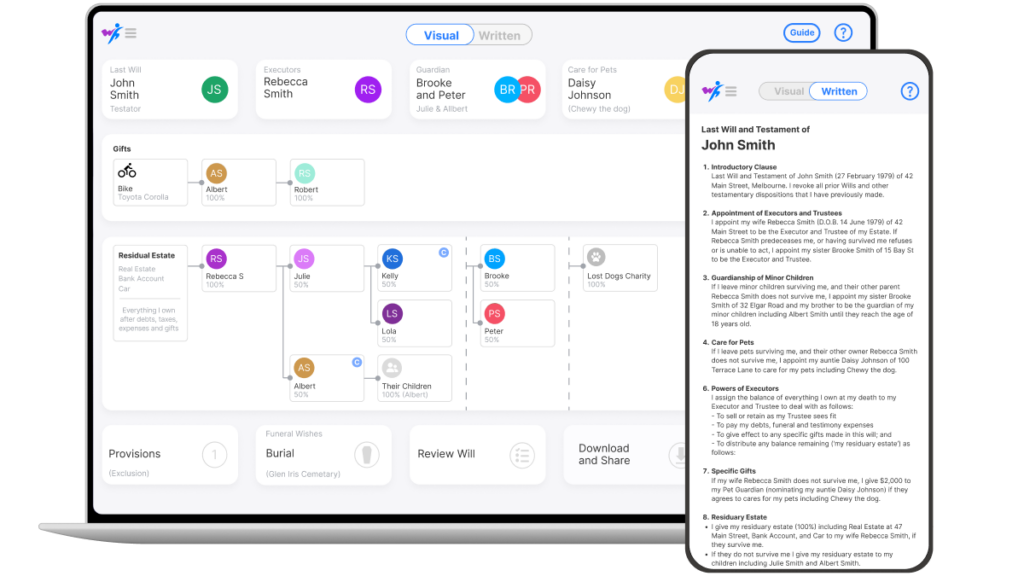
Ready to Create Online Wills in South Australia?
For many, taking the first step is the hardest part. If you need help, why not try Will Hero? You can sign up for free and draft a Will visually. Clarify your wishes as you learn about Wills and estate planning with our guides and AI Assistant.
You can also test your Will under different scenarios using a free Scenario Testing account. Upgrade only if you want to review and download the written document. Will Hero makes it easy to create online wills in a way that is more visual, interactive, and even fun—instead of difficult or daunting.
No matter how you choose to make your Will, start today and protect your loved ones and your legacy.
Will Hero helps you make Online Wills in WA
With a secure, affordable, and lawyer-approved service, we’re making it easier than ever to create your very own online wills in South Australia. Here’s how:
Visual Approach
Create your Will online using interactive visualisations to better understand how your Will works.
AI Assistance
Get AI assisted help 24/7 for any questions about Wills, estate planning and SA local laws.
Scenario Testing
Visually test what might happen to your estate if people passing away before you.
Legally Valid in SA
Designed to meet South Australia’s State-specific legal requirements.
Lawyer Approved
Drafted by Lawyers.
Personalised by you. You can even make more than just a simple Will.
Exceptional Value
30-day money back guarantee.
No questions asked!
Safeguard Your Legacy with Online Wills in South Australia
Don’t wait any longer to protect your assets and provide for your loved ones. Start your free trial with Will Hero today and experience the ease and convenience of creating state specific online wills in South Australia.
In just a matter of minutes, you can have peace of mind knowing that your final wishes will be honoured.
Disclaimer: This blog provides general information only and does not constitute personalised legal advice.